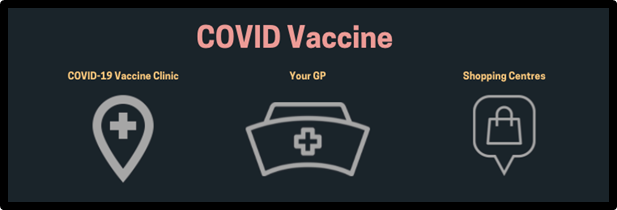Where to get help, how to get vaccinated?
We have now covered the reasons that vaccination is important, how different types work and their potential side effects. To wrap up our focus on the topic, here is some information on where you can get vaccinated.
The best place to get vaccinated depends on the disease being prevented and your personal situation. Our discussion in this post are general and for an “average person”, so please consult your doctor for personalised advice.
With COVID vaccinations at the forefront of everyone’s mind, we will start with that.
COVID-19
At the time of writing (July 2021), one of the best places in Australia to get a COVID vaccination are purpose-built mass vaccination hubs around your state. As an example, in Sydney, there are mass vaccination centres at the NSW Vaccination Centre in Homebush (Olymic Park) or at hospitals such as Westmead and RPA hospitals. There are also GP run respiratory clinics that does both Covid-19 testing and vaccinating. The vaccine is free to everyone in the country, regardless of immigration or Medicare status.
The government is also starting to supply a steady stream of vaccines to GP clinics and most GPs are already offering Covid-19 vaccines. For anyone with underlying health issues, such as immunodeficiency or cancer, this is the best option as your doctor can assess your personal risk.
In some states, temporary vaccination clinics are being held in shopping centres.
The Australian government website has an eligibility checker where you can see which COVID vaccines you are entitled to and find your nearest clinic.
COVID vaccines can be received at special COVID clinics, your GP or some shopping centres.
Routine Vaccinations (MMR, Polio, Hepatitis A & B etc. )
Most Australians would have had their routine vaccinations by the time they finish highschool, but sometimes, catch up vaccines are necessary for various reasons. For example, vaccination schedules sometimes change based on new data and as a result the government sometimes recommend extra booster doses. Other examples include teenagers who has missed their HPV vaccines given at school or young adults who grew up with parents who are against vaccinations but have now decided to get vaccinated as they are no longer minors. Every case tend to be unique and if you speak to your doctor, they will often taylor a specific catch up schedule with you and advice from the Public Health unit.
Children are often vaccinated based on the National Immunisation Program Schedule. The schedule highlights the ideal time for children to get vaccinated to give them the best protection against diseases.
Another time to consider routine vaccinations is if you are planning to fall or are pregnant. Doctors will often talk to you about getting a booster for Whooping Cough to protect yourself and you future baby.
Routine vaccines can be received at health clinics, your GP or in schools.
Travel Vaccines
In Australia, the vaccine-preventable diseases that we are concerned with are included in the National Immunisation Program Schedule. If you go abroad, however, there are more illnesses that you need to be wary of.
Diseases such as rabies, encephalitis and cholera are extremely rare in Australia, but many places in Asia and Africa have cases. Because of this, countries that have eradicated infectious diseases such as (Zika and yellow fever) might mandate vaccinations for them.
For those countries, immigration might deny entry to unvaccinated persons to avoid the disease returning.
The best place to get travel vaccinations is a travel clinic or your GP. Some pharmacies have travel clinics offering vaccines as well.
Holiday vaccines can be received at travel clinics, your GP or some pharmacies.
Work Specific Vaccines
Some work places mandate specific vaccines based on their workplace exposures. For example, doctors and healthcare workers have to show their immunisation records or prove that they are immune to certain conditions such as Hepatitis B, Measles, Mumps, Rubella and Influenza before they are allowed to see patients. Vet doctors and nurses are often advised to get vaccinated against Rabies before they are allowed to handle bats. These advice are once again tailored to your specific work and needs.
Where to find help getting vaccinated
Usually, the best place to get vaccinated is your doctor. For anyone without a regular doctor, or whose doctor cannot vaccinate them, a specialised clinic for the type of vaccine you need is your best option.
If you have underlying health problems, do not go to a clinic without speaking to your doctor first. The side effects that are harmless to the typical Australian might be more dangerous to someone with a compromised immune system, and your doctor knows what is best for you.
For COVID, there are loads of pop-up clinics around the country. Find your nearest clinic and which vaccines you are eligible for with the eligibility questionnaire. Even if your doctor is not the right place to receive your vaccination, they will let you know what is.
Felicity Thompson
and




